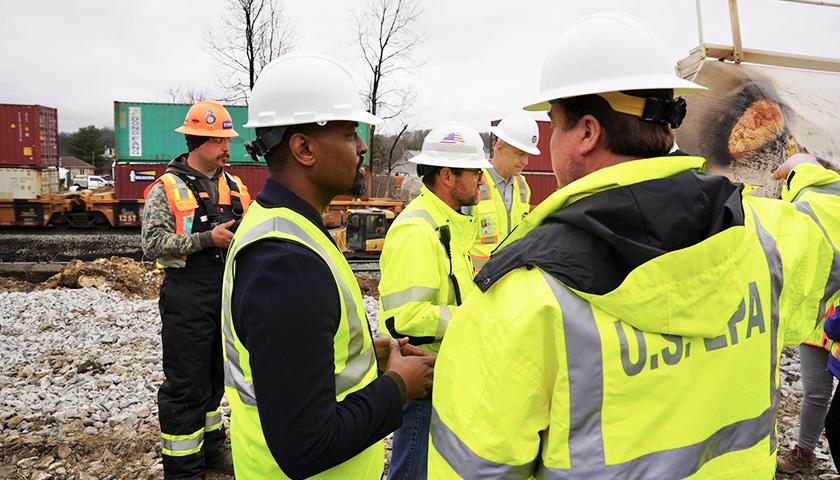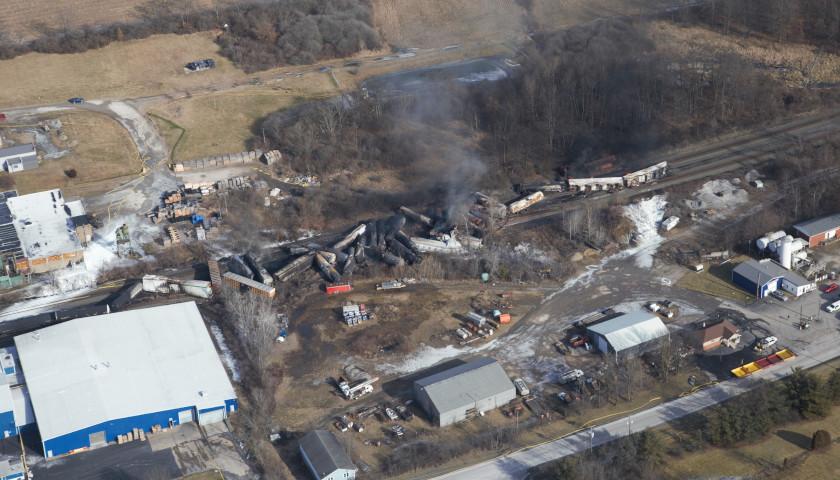Although the Environmental Protection Agency (EPA), ordered rail company Norfolk Southern to test for dioxins following the catastrophic February 3rd train derailment, and says that East Palestine suggests a “low probability” of dioxin contamination, a retired chemist told The Ohio Star that dioxins “were produced” during the burn and “it’s not a question of ‘maybe.'”
The EPA has maintained there is a “low probability” that dioxins were released from the derailment based on its sampling for “indicator chemicals” that it says would signal the presence of dioxins in East Palestine.
But Gerald B. Curtis – a retired chemist and former president of GBCA who spent his career developing patented, chemically-based construction industry components and materials, and oversaw their application – told The Star that when vinyl chloride is open-air burned as it was in East Palestine, deadly dioxin is definitively produced and is far more dangerous than breathing air-diluted vinyl chloride gas.
“Airborne vinyl chloride is vastly less dangerous than generated persistent dioxins in the ground, or in the water,” Curtis told The Star.
Curtis also noted that the “collective we” should have known the consequences that would result from an open air burn.
“I believe that both the EPA and the [Norfolk] Southern Railroad knew or should have known the consequences of open-air burning of vinyl chloride gas,” Curtis told The Star.
Curtis cited a 2000 study conducted by a research group formed jointly by the Gifu Prefectural Institute of Health and Environmental Sciences and the National Institute for Environmental Studies in Japan that found that out of three types of plastic, vinyl chloride produces the largest amount of dioxin when burned, and non-plastic substances produce more dioxin when burned together with chlorine compounds.
The study found that open-air burning of vinyl chloride gas at ~800°F will produce dioxin that is free to deposit via rain or settling anywhere downwind, noting the preferred method of burning is at ~2,000°F to 3,000°F in a special incinerator.
“A special incinerator is required to assure trapping all vinyl chloride intended for burning as well as the intermediaries produced by its burning, such as phosgene and dioxins,” Curtis said; adding, “An open-air trench beside the railroad tracks does not qualify as a special incinerator.”
According to the EPA, dioxins are toxic chemicals dubbed “persistent organic pollutants” (POPs). They are known to cause cancer, disrupt the immune system, and cause reproductive harms. Dioxins are difficult to degrade. The substance frequently builds up in humans and other animals after entering the food chain.
Curtis told The Ohio Star the burning of the vinyl chloride generated soot that, in all likelihood, contains dioxins.
“It floats in the atmosphere; it may settle on its own. The dioxin soot – as it does with any kind of dust in the atmosphere – falls on the ground because of rain, and now you have a persistent chemical – one that does not degrade either at all or easily, on the ground,” Curtis said.
50 train carriages, 10 of which were carrying hazardous materials, derailed in East Palestine on February 3rd. Hundreds of residents evacuated as a result of a controlled release and burn of noxious vinyl chloride that Norfolk Southern carried out on February 6th to stop an explosion, they said.
Officials told East Palestine residents on February 8th that they could safely go home, despite the reports of hundreds of dead fish and wildlife in the Ohio river near East Palestine and residents complaining of headaches and illness since the derailment.
There have been a growing number of reports of health concerns from residents following the derailment. Some residents say medical professionals have diagnosed them with bronchitis, lung issues, and rashes that doctors and nurses suspect are linked to the chemical exposure.
Curtis told The Ohio Star that this catastrophe was “preventable” and he doesn’t think there was a concern for explosion.
“My guess is that the tank car was designed as a piece of equipment to carry whatever it was supposed to carry and have a safety factor. Think about the consequences. The tank car explodes. What do you get? Vinyl Chloride. No big deal. It’s toxic and it’s not pleasant to breathe. But it’s nothing compared to dioxins,” he said.
Curtis also noted that during the reported two hours both governors were discussing “options” with Norfolk Southern Railroad officials, cooling water could have been applied to the involved tank-cars, thus cooling them and avoiding any reasonable likelihood of an explosion.
– – –
Hannah Poling is a lead reporter at The Ohio Star and The Star News Network. Follow Hannah on Twitter @HannahPoling1. Email tips to [email protected].





